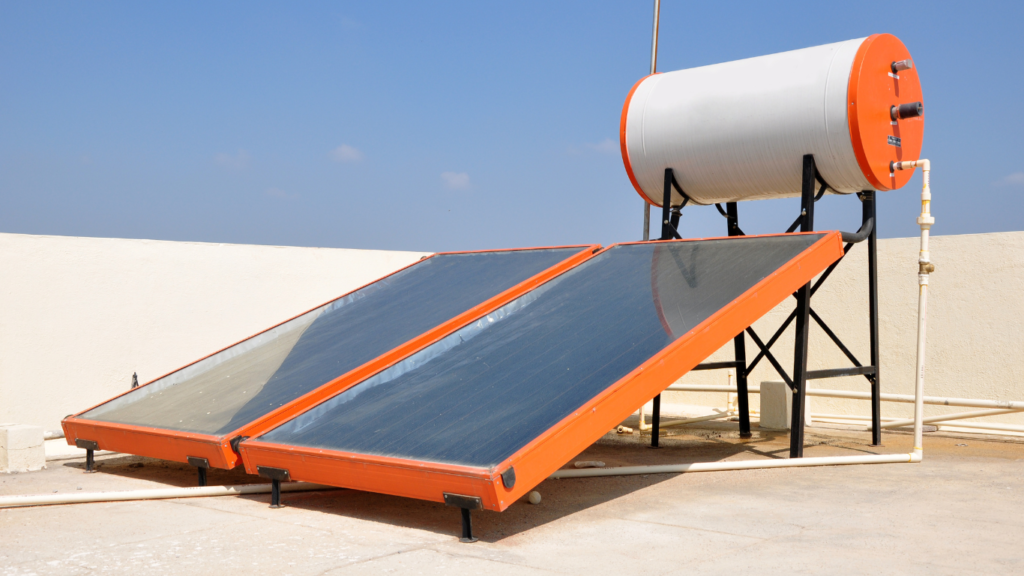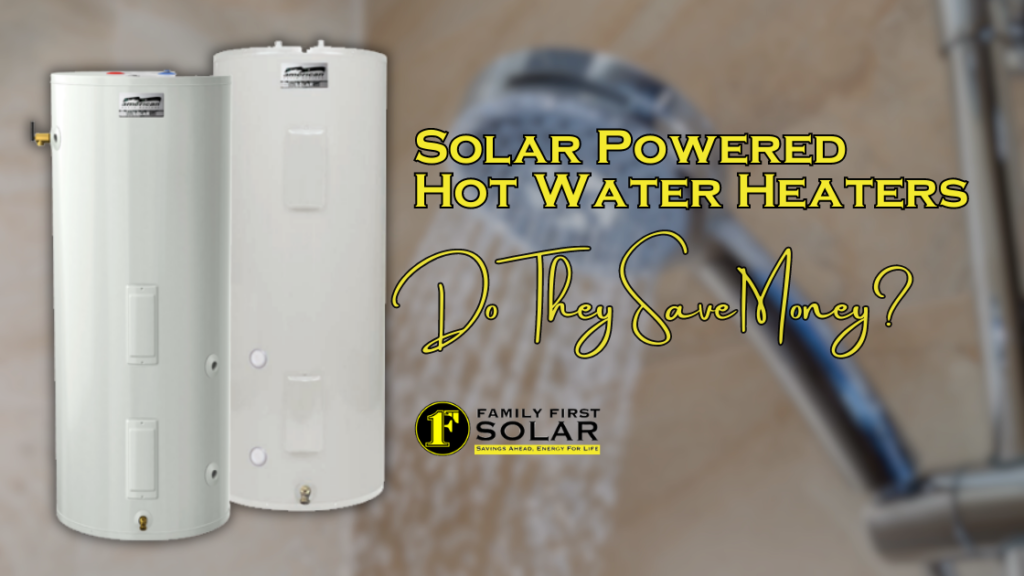Solar Powered Hot Water Heaters: Do They Save Money?
When it comes to going solar, there are quite a few solar solutions beyond just a traditional solar array. Solar panels on a home are an incredible way to have significantly lower utility bills and reduce your environmental impact.
But other solutions, like solar water heaters, allow people to harness the power of solar energy in different ways. Or for homes that do have solar panels, solar water heaters can help them get entirely off the grid if their solar panel system is leaving them with a small utility bill.
In this blog, we’ll talk about how solar water heaters are different than traditional water heaters, explain how solar water heating systems work, talk about a few different types of solar water heaters, and discuss how much money you can save when installing a solar hot water heater.
How are solar water heaters different than traditional water heaters?
The main difference between a solar water heater and a traditional water heater is where it gets the energy to operate.
How does a traditional water heater work?
A traditional water heater uses either electricity or gas to heat up the water in a tank, so when you need hot water in your home, whether that’s in the dishwasher or the shower, you have hot water to use. Gas water heaters and electric water heaters work in essentially the same way, though.
If you have a traditional water heater, you’re all too familiar with turning on the hot water, only to have to wait several minutes for the water coming out of the tap to actually be warm.
The reason why it might take a minute for the water to heat up is that the heating element (either powered by electricity or gas) heats the water in the entire tank, and it isn’t queued up to do so until you turn on the hot water faucet.
How does a tankless water heater work?
A tankless water heater works a little differently than a traditional water heater, so it’s worth mentioning how a tankless system heats the water. A tankless water heater—true to its name—doesn’t have a holding tank of water.
When you open a hot water faucet, cold water enters the tankless water heater through an inlet pipe. Powerful heating elements inside the unit quickly heat up the water as it passes through a heat exchanger.
The heat exchanger raises the temperature of the water to the desired point and then once the water is heated, it flows out of the tankless water heater and reaches your tap.
Both a traditional water heater and a tankless water heater rely on either electricity or natural gas to operate. And unlike traditional water heaters, a solar water heater uses solar energy to operate.
How do solar water heaters work?

So how can a water heater be powered by solar panels? A solar water heater has three main parts; the solar collectors, the circulation system, and the storage tank. There are two types of circulation systems—active and passive systems. We’ll dive into that in more detail in just a little bit.
For now, we’ll begin by explaining how the system works in a broader sense. We’ve talked quite a bit in past blogs about how solar panels work, but solar water heaters actually use a different method of capturing solar power. Instead of using a solar panel, they use solar collectors.
There are several different types of solar collectors as well; batch collectors, flat-plate collectors, and evacuated tube collectors.
How do solar collectors work?
These collectors are designed to absorb the sun’s energy and convert it into heat. They have a dark-colored surface and are covered with a transparent material to trap and retain the heat.
While solar panels turn the sun’s energy into electricity, solar collectors specifically capture the sun’s heat and transfer it to a fluid, typically water or a heat transfer fluid.
Solar collectors are primarily used in solar water heating systems. The collectors are constructed with materials that have high thermal conductivity to absorb and retain as much heat as possible.
The circulation system takes the heat collected and uses it to heat the water in the storage tank, which is very insulated to keep the water warm. Storage tanks also often have a secondary heating element to heat the water if users need hot water when there is no solar power available. Heated water from the tank flows into your home when you turn on the hot water tap.
Types of Solar Water Heaters
Now for the further discussion of circulation systems. The main difference between the active and passive systems is that passive systems use less energy, but also don’t function when there is no sunlight.
Active solar water heaters
Active solar water heaters use pumps or fans to circulate a heat transfer fluid—usually water or antifreeze—between the solar collectors and the storage tank. When sunlight hits the collectors, the fluid in the collectors absorbs the heat and carries it to the storage tank, where the heat is transferred to the water.
Passive solar water heaters
Passive systems rely on natural convection and gravity to circulate water between the collectors and the storage tank. As the water in the collectors heats up, it becomes less dense and rises, creating a natural flow that moves the heated water to the storage tank. This process continues as long as there is sunlight to provide heat.
As we mentioned, passive systems have lower energy costs, and you can purchase one that has a backup heater so you can have hot water at night or when it’s cloudy.
Can I have a solar water heater in freezing temperatures?

While we don’t have to worry about freezing temperatures here in Hawai’i, we’ll still address this question for anyone coming across this article or if you were just curious.
You can have a solar water heater in cold climates, but you’ll definitely need to consult with a professional to ensure you have several things in place.
First, you’ll need a backup heater in extremely cold climates because you just don’t want to risk being without warm water.
Next, your solar hot water system will need freeze protection mechanisms in the solar collector and proper insulation to prevent heat loss, keep water from freezing in the system, and keep the water warm in the storage tank.
How much do solar hot water heaters cost?
Solar water heaters can cost anywhere from $4,000-$13,000, with an average cost of around $9,000. This is likely going to be more than both a traditional water heater or a tankless water heater.
The main determining factors in pricing are how much hot water you need for your home, and whether you choose an active system or a passive system. Obviously, systems that have a bigger tank are going to be more expensive than those with a smaller tank.
And active systems are more expensive than passive systems because they have more mechanical parts like pumps, fans, controllers, and sensors, to actively collect, convert, and distribute solar energy.
On the other hand, passive solar water heaters rely on natural mechanisms such as convection, radiation, and thermal mass to distribute and store solar heat without the use of mechanical or electrical components.
Regardless of how much you spend on a solar water system, you can get both federal and state solar tax rebates on your solar water heater. This looks like getting 30% back on your investment on your federal taxes, and 35% back on your state taxes, significantly reducing the cost.
Also, you’ll save money on your heating bill, which for many people makes it worth it.
How much can you save with a solar hot water system?
According to energy.gov, you can save anywhere from 50-80% on your water heating bills. And, as energy.gov also points out, your water heating cost won’t fluctuate with the ever-increasing prices of both natural gas and electricity.
Are solar hot water heaters worth it?

If you do not have solar panels on your home and you need to replace your water heater, it’s definitely worth it to have a solar water heating system installed if you can cover the upfront cost. The solar tax rebates and monthly energy savings will make it almost an immediate cost savings.
If you do already have a solar system, it’s definitely worth contacting Family First Solar to have a free consultation. If you’re already powering your home with solar energy then reducing your use of fossil fuels and your water heating bills are not main concerns.
But, for some who desire to be completely off the grid, they’re looking for ways to eliminate any last need to rely on electricity from the grid. In that case, a solar water heater might be the thing that pushes you over the edge of not needing to pay the utility at all.
When you meet with someone from Family First Solar, we can help you determine if installing a solar water heater is worth it for your home. Give us a call at (808) 724-4072.


